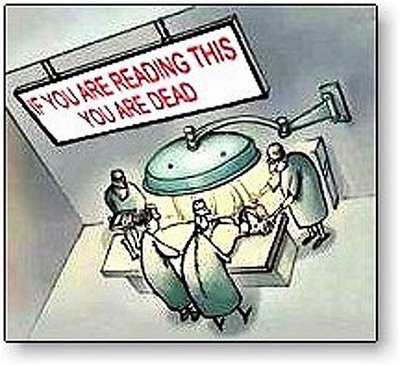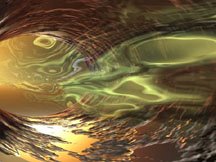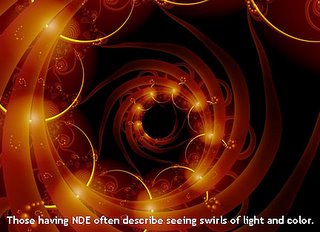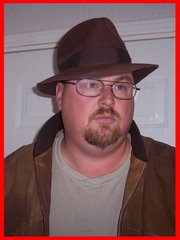 Do we live on after we live our earthly lives? It is a question that many eagerly answer yes to but many others refuse to consider. Let’s take a closer look and you can decide for yourself…
Do we live on after we live our earthly lives? It is a question that many eagerly answer yes to but many others refuse to consider. Let’s take a closer look and you can decide for yourself…
Jayne died once. It was an experience she'll never forget.
Almost 50 years later, the South Carolina woman recalls the experience with vivid clarity. It happened when her heart suddenly stopped during the birth of her second child. "I felt something leave my body. I couldn't see because I was enveloped by a gray mist, but I was never unconscious," she says. "Standing in that mist, I began to realize I had died, yet I had intense feelings of joy and gratitude that I was still 'alive.'" The mist began to dissipate and gave way to a bright light. "I became one with the light and was cradled by it. I remember such feelings of love and protection that it was ecstasy. I actually began to wonder how much more I could take before I would shatter."
The mist began to dissipate and gave way to a bright light. "I became one with the light and was cradled by it. I remember such feelings of love and protection that it was ecstasy. I actually began to wonder how much more I could take before I would shatter."
In the new realm she had entered, Smith conversed with another being. The being answered questions for her, such as "What is the meaning of life?" but prevented her from carrying much of the knowledge back to earth. Painfully, she awoke to find her doctor massaging her heart.
Smith's recollections are a classic example of a "near-death experience." While these experiences differ from person to person, they tend to share many of the same traits. Common among them are the sensations of separating from one's body, seeing or feeling an intense, enveloping light, having powerful emotions, meeting with deceased relative, a supreme being, or both, and reviewing one's life.
Approximately 9% to 18% of people near death have a near-death experience, says psychiatrist Bruce Greyson, MD, who compiled this statistic from several studies. Though the majority of respondents report pleasant experiences, a few do relate frightening or unpleasant ones.
Doctors frequently dismiss near-death experiences as hallucinations brought on by medication. But medications are an unlikely trigger for such events, says Greyson, since people who are medicated, intoxicated, or who suffer from high fevers actually report fewer and less elaborate stories than those who have a sudden heart attack or accident.
Some experts theorize that oxygen deprivation during the last moments of life causes hallucinations. Others suggest these experiences are brought on as the body releases a rush of endorphins to combat the terrible fear of dying. But hallucinations caused by oxygen loss are often distorted, and simply identifying brain chemicals doesn't prove that they cause the experiences, Greyson says.
Instead, he suggests that a near-death experience may be the result of dissociation, a typical reaction to stress. Dissociation is a state in which thoughts and feelings temporarily "separate" from consciousness. Daydreaming and total absorption in a book are examples of mild dissociative experiences. Pathological dissociation includes amnesia and multiple personality disorder.
Those who have survived a near-death experience almost inevitably claim that their outlook has changed considerably. Many of those changes are what one would expect -- increased belief in an afterlife, greater concern for others, less interest in material possessions. Kenneth Ring, PhD, author of Life at Death and Heading Toward Omega, has documented that survivors feel less anxiety about death. The deeper the experience, says Ring, the greater the overall change in the person's life.
There can be a negative aftermath, too. P.M.H. Atwater, author of several books on the subject, says that most people who experience a near-death experience go through a period of depression. "Either they believe they're crazy and they have no way to understand what happened to them ... or they feel somehow lost," she writes in her new book, The Complete Idiot's Guide to Near Death Experiences.
Fortunately, the depression is generally short-lived. Atwater also documents physiological changes, such as lower blood pressure, increased allergies, sensitivity to light and sound, and less tolerance for pharmaceuticals and other chemicals.
Jayne says her experience has made her both more spiritual yet more distanced from her church. "My minister was visibly uncomfortable. He just didn't want to discuss it." Since then, she's found herself drawn to various organizations involved with spirituality, including spiritual healing.
"My NDE changed my whole world view, but not my daily life," Smith says. "I was a happy person before and I am now. But I carry with me a knowledge that we humans are so much more than we know."
A Seattle doctor specializes in Near-Death Experiences and his research may come closer than anyone ever has to answering the question, is there life after death?
Dr. Melvin Morse is a pediatrician who used to think that people who were interested in near-death experiences just wanted to be on television talk shows. But then something happened to one of his patients that changed his opinion. Dr. Morse believes he's found evidence, a glimpse of something that awaits us beyond our current existence. Now he believes the evidence points to something he never before considered, life after life.
"I interviewed a 6-year-old boy," said Dr. Morse. "We resuscitated him. He opened his eyes and he dramatically said, 'That was weird, two guys just sucked me back into my body.'"
Dr. Morse is a respected pediatrician. He was a skeptic about the issue of life after death until he was confronted with a story he couldn't explain away.
"She was what you would call clinically dead," explained Morse. "She was under water for 19 minutes."
After the 7-year-old girl was resuscitated, she started drawing pictures.
"What she described to me was not a hallucination. It was a blow-by-blow accurate description of her own resuscitation, but from a bird's eye point of view," said Dr. Morse.
The child believed she had to go back to her body to help her mother with her unborn brother. She drew her unborn brother with a big red heart. Several months later her brother was born with heart disease.
"How can dying, comatose patients perceive anything? That's what fascinated me," said Dr. Morse. "I knew that something important about human consciousness was to be learned."
Critics say it is because Christians tend to see Jesus and Indians see Hindu gods, that the near-death experience doesn't seem scientifically credible.
A social worker, Kimberly Clark Sharp says she couldn't come to terms with her own out of body, near-death experience until one of her own patients had one.
Sharp's patient went into cardiac arrest. After she was resuscitated, the patient insisted she had risen out of her body and floated up around the hospital where she saw a blue tennis shoe on the third floor ledge.
To calm down her patient Sharp went to look. "I did find a blue tennis shoe on the ledge," said Sharp. "She got everything right as she described it to me."
"It is clear even when people are flat lining in the last moments of life, something profound is happening," said Dr. Morse. "It is something today's monitors can't pick up."
Dr. Morse's findings have been published in medical journals and he's working to see if something physically changes in the right temporal lobe of the brain when someone has a post-death experience.
"One child told me it was a light who told her who she was and where she was to go," said Dr. Morse. "I want to interact with that light that tells us who we are and where we are to go while we're still alive. That to me is a challenge of the near-death experience."
Dr. Morse believes you can get in touch with that part of the brain through prayer, meditation, even the simple rhythmic movement of knitting. There's no absolute proof, but he believes that people who have that near death experience are stepping into another realm. Well I don’t have the answer here anymore than Dr. Morse does. I do think that something is going on and as a Christian I do believe we will live after this life, but just what that consists of or what it will be like I can’t tell you. Just another peek at this weird world of ours.
I’m Average Joe


No comments:
Post a Comment